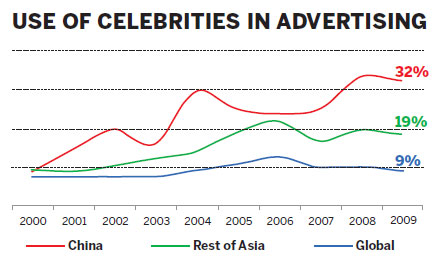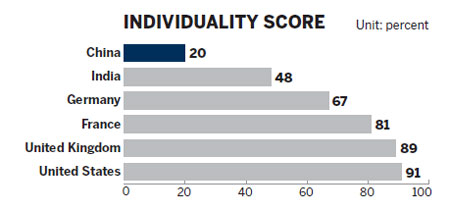The appeal of celebrity advertising
Updated: 2012-05-11 08:40
By Saurabh Sharma (China Daily)
|
||||||||
Celebrities are shorthand for what the brand means - and shortcut to new concepts
The media in China is flush with stories about local and international celebrities. Xinhua - China's official news service - produces a list of the nation's top 10 sports stars and important web portals compile the list of the most influential people in China.
Over 60 percent of all the brands being advertised use celebrities. This adds up to over 100 celebrities endorsing a gamut of brands from categories as diverse as automobiles, to over the counter (OTC) drugs, to real estate and beyond.
Not just by itself but also in relative terms, China is one of the top three markets in the world using celebrities in advertising, along with South Korea and Japan.
In the past 10 years, the use of celebrities in advertising in China has grown at an accelerated pace, and it has widened its lead over both the global average and the Asian emerging market average. (See chart below)

Even among the BRIC nations, China is way ahead of others in its use of celebrities in advertising.
What drives Chinese marketers' love affair with celebrities? I have tried to examine the reasons both from a historical perspective as well as from the point of view of contemporary social and economic reality.
1. Role models
The years between 1949 and the early 1980s occupy a very special place in the history of Chinese broadcast media. It was the time when content of mass media was dominated by government communication. This often created model military heroes or as they were called "Heroic and Model Servicemen". They were designed to inspire "improved" behavior and "enhanced thinking" among the Chinese population. People in China have had extensive experience with the promotion of such moral and ideological "best practices".
These communication campaigns were, and some are still, famous for the memorable messages and the distinct impression they left in the minds of millions of Chinese. Examples range from "Learn from Comrade Lei Feng" (1940-62) to stories about Ouyang Hai (1940-63) and Wang Jie (1942-65). These personality promotion campaigns highlighted the virtues of ordinary everyday acts of service to the society and the country.
The post-1978 emergence of "socialism with Chinese characteristics" led to the slow but steady demise of government communication campaigns that valorized such role models. In the past couple of decades, the media-market nexus has been busy creating a new consumption culture. This new world of consumption needs its own heroes, and Chinese celebrities have come to occupy this position. These celebrities symbolize knowledge, trust and aspiration that emerges from their demonstration of special skills, talent and fame. Commercial media loves their fame and leverages it to attract eyeballs.
2. Culture and popular culture
Historically, China has been a collectivist society. The Confucian ideal of government assumed harmony of interest between the ruler and the ruled. The individual was naturally more disposed to adhere. There are examples in language that point at limited individualism. The Chinese word for everybody - for example - is da jia, which means a "big family". The word for country is guo jia, which translates into "home state" - once again, it is a big family, not just nameless strangers.
There are many people but all of them come together in one big cohesive familial unit. Chinese culture tends to bend toward the notion of many people not implying many voices but one single unit.
Even some cultural researchers have pointed out that the concept of "personality" or "individuality" is naturally weak in Chinese culture. China also scores low on the global Individuality Score (See chart below). Although there are words for "personality" in the language, their connotations and implications are somewhat different to Western languages.

In this wider context, celebrities are as much aspirational role models as they are a way for people to express and experience individualism vicariously. It is a kind of restrained release of individualism - otherwise impossible in a collective society.
Compare this traditional reality with today's socio-cultural context. The media-market nexus, rising popularity of reality TV and widespread access to Internet help the average person to express himself. Reality TV and the Internet are becoming the breeding grounds of self-styled celebrities like Feng Jie, Furong Jiejie among others.
3. Values and beliefs
While China's fundamental values and beliefs go thousands of years back, there has also been a lot of change in the past half a century. First it was Communism's reinterpretation of religion and traditional Chinese social mores and now the new construct of the socialist market economy is bringing about more change. Rapid change has created new challenges which many Chinese academics and the media have described as China's "moral crisis"; "family crisis"; "marriage crisis"; and "motherhood crisis".
The State has responded to these "crises", and tried to bridge the gap between what remains of the Chinese socialist value system and the changing social environment. The desire to focus on the principle of "people first", and the vision of a "spiritual civilization", and "harmonious society" reflect this.
The recent rise in the number of people looking for a religious belief is another case in point.
In the midst of such widespread social, economic and cultural change, celebrity endorsement for brands has a bigger potential opportunity than just awareness.
Bringing alive the values that these celebrities stand for will only add more texture to the brand's meaning in the consumer's mind thus making the brand more unique and believable than others.
4. Pace of market development
China has changed very quickly in the past 30 years. In terms of physical infrastructure, technological capability, and size and scale of business transactions - some of the key cities in China such as Beijing, Shanghai, Guangzhou and Shenzhen, are indeed world-class. But in spite of this development, most of the modern advertising and marketing for consumer products in China has a history of only 25-30 years. Brands in many of the categories could still be targeting consumers who are buying these products for the first time. This has a huge impact on the nature of marketing communication in China.
As also observed by Marieke de Mooij, a cross-cultural communication specialist and visiting professor at various universities: "Generally, advertising in developing markets focuses on product attributes, and only when the market is developed do more sophisticated approaches emerge."
As a developing market, where a lot has happened simultaneously - China still shows a lack of discrimination. A lot of consumption is still driven by the desire to acquire the biggest, brightest and the most popular. People are still learning to consume and many categories and brands are still educating buyers about what the product is for, how to use it and what makes it superior. In this wider context, celebrities have a vital role to play. They are a mode of perception - shorthand for what the brand means. They give meaning to what they are being associated with and their use is a shortcut to the adoption of new concepts and habits.
In a developing market, with limited vocabulary for many of the new product categories, celebrities provide a bridge of familiarity with a healthy dose of aspiration. In a single shot, they both hasten and glamorize the process of learning. This makes celebrities very powerful in their ability to help people try new things and consume with greater confidence.
The author is planning partner, Ogilvy and Mather, Beijing. The views do not necessarily reflect those of China Daily.
(China Daily 05/11/2012 page9)

 Relief reaches isolated village
Relief reaches isolated village
 Rainfall poses new threats to quake-hit region
Rainfall poses new threats to quake-hit region
 Funerals begin for Boston bombing victims
Funerals begin for Boston bombing victims
 Quake takeaway from China's Air Force
Quake takeaway from China's Air Force
 Obama celebrates young inventors at science fair
Obama celebrates young inventors at science fair
 Earth Day marked around the world
Earth Day marked around the world
 Volunteer team helping students find sense of normalcy
Volunteer team helping students find sense of normalcy
 Ethnic groups quick to join rescue efforts
Ethnic groups quick to join rescue efforts
Most Viewed
Editor's Picks

|

|

|

|

|

|
Today's Top News
Chinese fleet drives out Japan's boats from Diaoyu
Health new priority for quake zone
Inspired by Guan, more Chinese pick up golf
Russia criticizes US reports on human rights
China, ROK criticize visits to shrine
Sino-US shared interests emphasized
China 'aims to share its dream with world'
Chinese president appoints 5 new ambassadors
US Weekly

|

|






